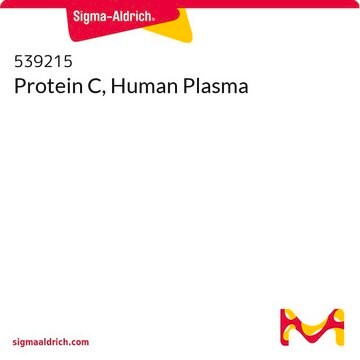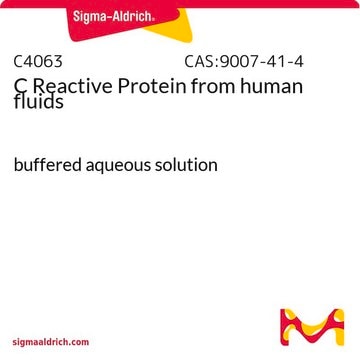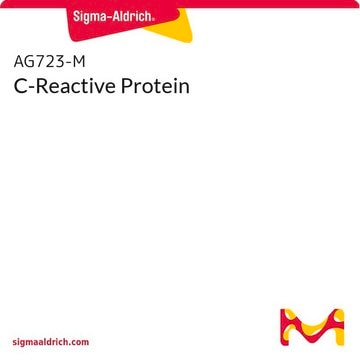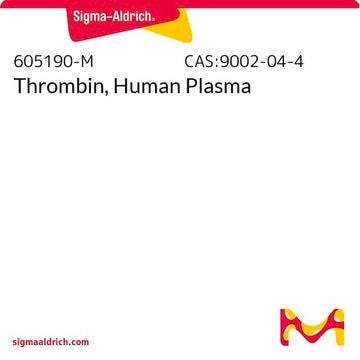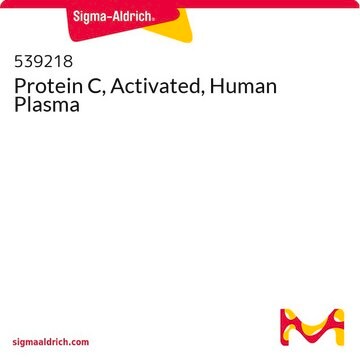P2200
Protein C from human plasma
Activated, lyophilized powder, ≥90% (SDS-PAGE)
Synonyma:
Activated Protein C
Přihlásitk zobrazení cen stanovených pro organizaci a smluvních cen
About This Item
Číslo CAS:
MDL number:
UNSPSC Code:
12352202
NACRES:
NA.61
Doporučené produkty
biological source
human plasma
Quality Level
assay
≥90% (SDS-PAGE)
form
lyophilized powder
mol wt
heavy chain 41 kDa
light chain 21 kDa
technique(s)
inhibition assay: suitable
solubility
H2O: 1 mg/mL
UniProt accession no.
storage temp.
−20°C
Gene Information
human ... PROC(5624)
General description
Protein C from human plasma is encoded by the gene PROC. In human chromosome, the gene is localised on chromosome 2q14. Activated protein C (APC) cleaves protease activated receptor 1 (PAR1) resulting in cytoprotective and anti-inflammatory effects. Clinical trials with APC implicates its use in treating severe early onset preeclampsia in pregnant women and prolongs pregnancy and helps in perinatal outcomes.
Application
Protein C from human plasma has been used for pre-treatment of endothelial cells prior to antibody-inhibition assay. It has also been used in activated protein C (APC) assay to determine its inhibitory effect on copper.
Biochem/physiol Actions
In addition, activated protein C has been shown to inhibit TNF-α induced expression of the inflammatory proteins VCAM, ICAM-I, and Ilk-8 in endothelial cells.
Protein C is a plasma, vitamin κ-dependent zymogen of a serine protease that can inhibit blood coagulation by inhibiting thrombin formation, selectively inactivating Factors Va and VIIIa.
Protein C is a plasma, vitamin κ-dependent zymogen of a serine protease that can inhibit blood coagulation by inhibiting thrombin formation, selectively inactivating Factors Va and VIIIa. The Protein C anticoagulant pathway is triggered when thrombin binds to the endothelial cell proteoglycan, thrombomodulin. This complex, which cannot clot blood, is a potent activator of the protein C zymogen. Activation involves the release of a dodecapeptide from the N-terminal domain of the heavy chain. The activated Protein C (APC) then binds to protein S on cell surfaces and inactivates the coagulation factors Va and VIIIa by proteolysis. APC has also been shown to bind to receptors on the endothelium of large blood vessels.
Physical form
Lyophilized powder from 20 mM Tris-HCl, pH 7.4, containing 0.1 M NaCl
Disclaimer
RESEARCH USE ONLY. This product is regulated in France when intended to be used for scientific purposes, including for import and export activities (Article L 1211-1 paragraph 2 of the Public Health Code). The purchaser (i.e. enduser) is required to obtain an import authorization from the France Ministry of Research referred in the Article L1245-5-1 II. of Public Health Code. By ordering this product, you are confirming that you have obtained the proper import authorization.
Storage Class
11 - Combustible Solids
wgk_germany
WGK 3
flash_point_f
Not applicable
flash_point_c
Not applicable
Osvědčení o analýze (COA)
Vyhledejte osvědčení Osvědčení o analýze (COA) zadáním čísla šarže/dávky těchto produktů. Čísla šarže a dávky lze nalézt na štítku produktu za slovy „Lot“ nebo „Batch“.
Již tento produkt vlastníte?
Dokumenty související s produkty, které jste v minulosti zakoupili, byly za účelem usnadnění shromážděny ve vaší Knihovně dokumentů.
Zákazníci si také prohlíželi
K A Hill et al.
The Journal of biological chemistry, 262(15), 7098-7104 (1987-05-25)
The kinetic properties of the stimulation by Tl+ of the amidase activity of bovine plasma activated protein C (APC) and a limited-proteolytic derivative of this enzyme, des-1-41-light chain APC (GDAPC), which has no remaining gamma-carboxyglutamic acid residues, have been compared
Identification of Genetic Variants Linking Protein C and Lipoprotein Metabolism: The ARIC Study (Atherosclerosis Risk in Communities)
Pankow JS, et al.
Arteriosclerosis, Thrombosis, and Vascular Biology, 37(3), 589-589 (2017)
Copper inhibits activated protein C: protective effect of human albumin and an analogue of its high-affinity copper-binding site, d-DAHK
Bar-Or D, et al.
Biochemical and Biophysical Research Communications, 290(5), 1388-1392 (2002)
Jinqiao Wang et al.
Dose-response : a publication of International Hormesis Society, 18(2), 1559325820917288-1559325820917288 (2020-05-20)
Although the effect of activated protein C (APC) on neuronal injury and neuroinflammatory responses has been extensively studied, the detailed mechanism underlying APC-protective effect in the blood-brain barrier (BBB) injury during ischemia is still not clear. In this study, the
David Stacey et al.
Nature communications, 13(1), 1222-1222 (2022-03-11)
Many individual genetic risk loci have been associated with multiple common human diseases. However, the molecular basis of this pleiotropy often remains unclear. We present an integrative approach to reveal the molecular mechanism underlying the PROCR locus, associated with lower
Náš tým vědeckých pracovníků má zkušenosti ve všech oblastech výzkumu, včetně přírodních věd, materiálových věd, chemické syntézy, chromatografie, analytiky a mnoha dalších..
Obraťte se na technický servis.

